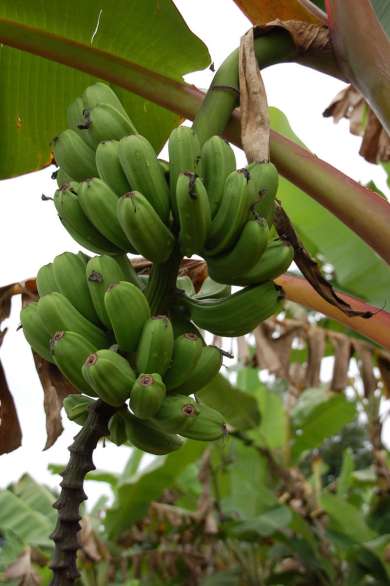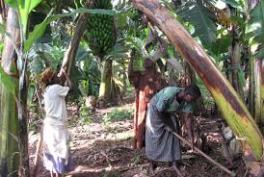Hunger
Ebola crisis: Huge risk of spread – UN’s Tony Banbury
The head of the UN Ebola response mission in West Africa has said that there is still a “huge risk” the deadly disease could spread to other parts of the world.
Tony Banbury declined to say if targets he had set in the fight against Ebola, to be achieved by Monday (December 01, 2014), had been met. The targets were for the proportion of people being treated and for the safe burial of highly infectious bodies.

The UN boss was speaking in Freetown, one of the worst-affected areas.
As BBC reports, on Sunday in Sierra Leone’s capital, bulldozers were clearing large areas for a new burial ground.
Bio-Science key to Achieving MDG1 in Africa
Aside Posted on Updated on
Bio-Science key to Achieving MDG1 in Africa
Cliff Abenaitwe
African countries have a long way to go if they are to achieve the
millennium development goal one (MDG1) of halving by 2015 the
proportion of people suffering from extreme hunger and poverty.
Less than 3 years to the deadline, the continent is still synonymous
with millions living below the poverty line and it is still affected
by hunger which seems to be going nowhere.

According to the UN food and agriculture 2010-2011, sub Saharan Africa is home to 26 percent of the world’s undernourished population, has the highest number of countries experiencing food emergencies due to in part, to climate extremes such as drought and exacerbated by civil unrest. The same reports reveals that Sub Saharan African still experiences increased food imports and is very vulnerable to global food price increases.
Experts attribute this trend to the poor performance of the agricultural sector.
The academy of science of South Africa (ASSAF) in its 2012 regulation
of agricultural GM technology in Africa report reveals that the poor
performance of the agricultural sector undermines Africa’s prospects
of attaining the MDGs and sustainable development in general. “The low agricultural productivity is associated with a wider range of
factors, including low investments in education, infrastructure,
research and development and over reliance on convectional technologies”, the report explains.
The solution for Africa is to improve the performance of the
agricultural sector.
However this report warns that much as the application of the best
conventional agricultural technologies can make significant
contribution to improving food security, it is not sufficient in
itself. “ The expansion of cultivated land through mechanization and provision of fertilizers can make a positive impact on food security in Africa but further benefits can be achieved by the application of modern biotechnology methods to plant improvement programs, principally for the so-called ‘orphan crops’ of particular importance to Africa”, the
report suggests.
According to Doctor Fen Beed, a pathologist from the USA who has worked in Uganda, Tanzania, Malawi and Ghana, it would be surprising if Africa met the MDG1 by 2015 but according to him, this can be achieved in years to come.“If African countries can adopt bio-technology and other good farming practices, poverty and hunger can be reduced but this will be after 2015,” he added.

Other scientists also agree with Doctor Beed on the role of bio-technology in agricultural improvement in Africa.
In the book Insights; Africa’s future.. can bioscience contribute?, Calestous Juma, a world renown scientist argues that African agriculture will need to intensify the use of science and technology more than would have been the case without the threats of climate change. “Investment in science and technology will be required along the entire agricultural value chain from resource intelligence through production, marketing, storage and ecological rehabilitation,” he explains.
Synonymous with what the researchers are recommending, African countries are making commendable progress in the use of Bio-science.
At Mukono zonal agricultural research and development institute research into improved crop species is under way and the institute has already developed improved fruit varieties. “The breeds we are developing as a result of grafting and cross breeding are disease resistant, quick maturing and high yielding,” Robinah Gafabusa, a fruits and vegetables research technician at this institute explains.

At the National research Organization NARO, researchers are developing different crop varieties to help farmers cope with the problem of diseases and low yields. According to Tendo Sali Lauben, a crop breeder at NARO, they have already developed banana varieties like M20, M9, M21 which mature fast, are disease resistant and they give high yields.

Numerous research institutions and scientists are currently working on developing different Bio- technologies and the African continent is getting itself ready for genetically modified technologies. However, Doctor Charles Lagu from the Mbarara agricultural research and development institute is calling for more sensitization of the farmers to adapt to these technologies if the current efforts are to bear fruits.
It is estimated that by 2050, the world population will increase to 9 billion people and this will increase food demand. The food and agriculture organization of the United Nations (FAO) is predicting that food production will need to increase by 70 percent.

To me, scientists and researchers, embracing Bio technology and genetically modified technology for agricultural improvement is the way to go and we all have a role to play in this.